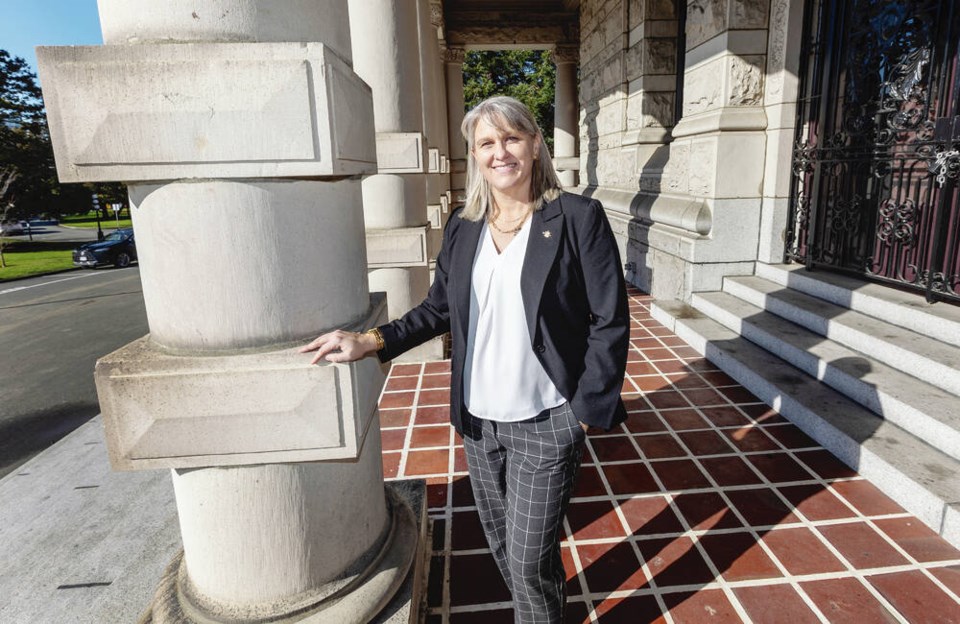Two women MLAs from opposing political parties are calling for better protections against online harassment after they faced a barrage of death threats and misogynistic abuse.
Selina Robinson, a veteran NDP cabinet minister who has represented Coquitlam-Maillardville since 2013, is used to getting nasty emails from people who don’t agree with her. But these messages stood out.
At the beginning of the year, her constituency office staff would get daily emails with the subject line: “I WILL KILL YOU SELINA ROBINSON” and a message describing how the person would cut her genitalia. Sometimes the person would send a dozen emails a day.
“I don’t scare easily, but you get a shot of adrenaline to see those words,” Robinson told Postmedia News.
Elenore Sturko, a former Mountie turned sa国际传媒 United party MLA who represents Surrey South, also started receiving threatening messages in late March, after she made the news for kicking a hunting knife away from a man in a White Rock cafe.
The email sender tried to set up an in-person appointment with Sturko. She sensed something was wrong so she told her constituency assistant to reject the appointment. The person responded with threats of death and sexual violence both to Sturko and the staffer.
“In the back of my mind, I’m like, ‘Do I need to be afraid? Do I need to be watching for someone who is seeking to harm me?’ ” Sturko recalls. “I don’t know this person’s mental state.”
Robinson remembers feeling especially anxious during a public Easter egg hunt in Coquitlam, worried that every unfamiliar face could be a threat.
“Women in power, who have a public profile, who are on TV regularly, that’s who he went after,” Robinson said. “And we didn’t know what he looked like so we can’t keep ourselves safe.”
Robinson and Sturko raised the issue with the legislature’s protective services staff, overseen by the sergeant-at-arms. Robinson wasn’t satisfied with the initial response — that she should contact her local police and that they would set up a filter to catch the abusive emails. Protective services staff, Robinson said, are very good at protecting MLAs at the legislative buildings but that protection wasn’t as robust in the face of online threats.

Sturko and Robinson reported the threats to their local RCMP detachments and Sturko ensured the files were linked.
Police were able to identify the man, who has a history of serious mental-health issues. It was determined he had sent threatening messages to nine MLAs — mostly women — and five constituency staff.
However, due to privacy concerns, Sturko and Robinson weren’t given the man’s name or photograph. It took months of prodding but they were finally able to obtain a photo so they could be more vigilant.
sa国际传媒’s sergeant-at-arms, Ray Robitaille, said his office is adding more safeguards to deal with online harassment amid a spike in threatening messages to MLAs and constituency office staff.
In 2020, his office was made aware of 120 inappropriate and threatening communications — messages that range from rude and profanity-laced to outright death threats that are considered criminal. By 2021, that number grew to 219. The next year, it almost doubled and, so far this year, his office has been made aware of 673 inappropriate or threatening messages.
Robitaille said a large number of the inappropriate messages are aimed at MLAs who are women or from racialized communities.
Sturko and Robinson want to talk to other women MLAs and create a dialogue on how to better deal with online abuse.
“We should be treating online harassment and threats as if they were in person,” Robinson said.
Heidi Tworek, director of the University of sa国际传媒’s Centre for the Study of Democratic Institutions, agrees.
“We’re still seeing a lot of the time it has to escalate into some sort of physical in-person threats before we get sufficient police response,” said Tworek, who co-authored a report called Trolled on the Campaign Trail that surveyed candidates about online abuse during the 2019 federal election.
As online harassment increased during and after COVID-19, she’s seeing a greater recognition that virtual threats can translate into real-world harm, but “we’re still not at the point where they’re taken as seriously as they need to be.”
The disproportionate level of vitriol aimed at women and racialized people could impact whether they choose to go into politics or remain in politics, Tworek said.
One positive takeaway from her research is that politicians across all party lines agree more tools are needed to deal with online abuse, which is why Tworek praised Robinson and Sturko for working together to elevate the issue.
Both Sturko and Robinson said that while they might trade jabs on social media or during question period, the issue of harassment against women transcends partisan politics.
“Selina and I, we’re not from the same party. We’re opponents but never enemies,” Sturko said. “We are both elected and chosen by our own communities to be representatives. And we both should be able to do that without fearing for our safety.”



